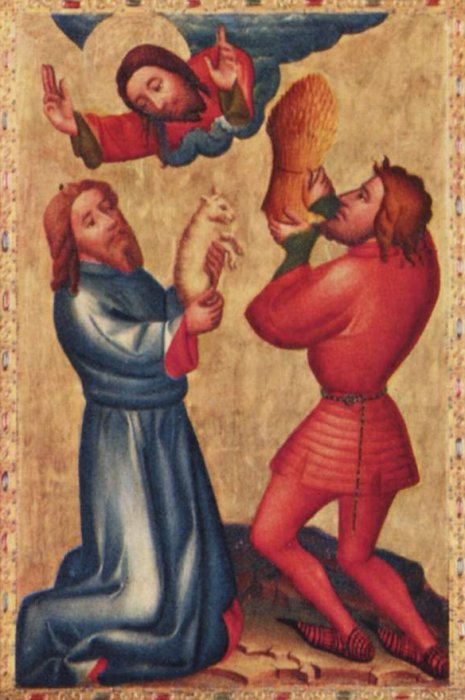Worship
in Genesis
By Stephen
Terry
 “If you do what is right, will you not be accepted? But if
you do not do what is right, sin is crouching at your door; it desires to have
you, but you must master it.” Genesis 4:7, NIV
“If you do what is right, will you not be accepted? But if
you do not do what is right, sin is crouching at your door; it desires to have
you, but you must master it.” Genesis 4:7, NIV
Those who have children often wonder how two
children in the same family can be so different? One child may be shy and
retiring while their sibling is a social butterfly, glowing with delight when
surrounded by others and always ready for a party.
When spiritual issues are at stake, parents
often fret over their children. Wondering what they did wrong in raising their
child when the child shows little interest in church or God, they beat
themselves emotionally over their perceived failure.
Self recrimination is as old as Adam and Eve.
The first couple was probably closer to understanding God than anyone since the
fall save Jesus. Wouldn’t such a home have every advantage in raising children
in the “nurture and admonition” of the Lord? After all, God spoke directly with
Adam and Eve and also with their sons Cain and Abel. You would expect children
raised that way to turn out perfect, following God and serving Him in everything.
But that is far from the truth. Although they
had every advantage, one son served God faithfully, while the other, Cain,
chose to go his own way. That path even included killing his younger brother,
Abel. Abel was followed by another brother who was faithful, Seth. And with
Seth and Cain were established two lineages: the sons of God, and the sons of
men.
The differences between the two were based on a
foundation of how they related to God. The descendants of Seth chose to accept
God on His terms. They listened to what He had to say and ordered their lives
according to His leading. The descendants of Cain, however, believed that God
should accept them on their terms. Cain felt that if he was a farmer and
offered vegetables, his offering should be accepted and God should not expect
something different. After all, it was the state of his heart and not what he
was offering that mattered, right? God certainly would not be picky enough to
demand something he did not have. It was
fine for Abel to offer a sheep, he was a shepherd. That was appropriate, but it
was also appropriate that he accept vegetables from someone who grew crops
instead of tending sheep.
We find such an attitude even today with some.
God should accept me as I am and not expect me to offer something different with
my means, my time, or my life. After all, He called me as I was. Why not
continue to accept me and my lifestyle as He found me? That seems only fair and
loving.
But the Bible is clear on basing our
relationship to God on our human reasoning.
“There is a way that seems right to a man, but in the end it leads to death.”
Proverbs 14:12, NIV In the very beginning, God tried to warn Cain about
this. He said that if we choose to go our own way instead of doing what is
truly right then “sin is crouching”
at the door. Sin leads only to death. (See Romans 6:23)
God warned Adam and Eve to avoid the Tree of
the Knowledge of Good and Evil because He knew it would bring death in its
wake. He did not want to see the death of His lovely creation. But when they
were offered a choice, the first couple chose to rely on their own discernment
rather than what God had told them. In this initial digression from the
righteous path, they sowed the seeds that would bring about the sons and
daughters of men that began with Cain.
What is miraculous is that in spite of the influence
of the great first transgression, some chose instead to “…call on the name of the Lord.” Genesis 4:26, NIV Ever since, God has had those who chose
His way rather than their own. Enoch, Noah, Abraham, and Joseph are examples.
They chose to live as sons of God rather than as men with no greater vision than
their own ideas and desires.
At times, those of the godly line were few in
number. In Noah’s day it came down to only those of his family. All others
perished. The earth was overwhelmed with
the flood of evil the sons of men had brought forth on the earth. God responded
to that flood with a flood of his own. Water cleansed the earth for a new
start. On an altar, Noah sealed the covenant that gave mankind a second chance once
the flood waters receded. Still speaking with man directly, God honored that
sacrifice with the rainbow, a symbol recognizing those who are willing to be led
by God.
Through their lives, the sons and daughters of
God are lights of God’s love shining in the world as a counterpoint to the
lives of the sons and daughters of men. These latter live lives that proclaim
they do not need God to lead them as they have minds of their own, and they are
perfectly capable of making their own decisions about what is right and wrong. They
have a methodology for determining what is reliable and what is not, and God
does not enter into the process. They believe this methodology is universally
applicable. Therefore, they are not pleased with the children of God who
continue to live by a different standard. These saints demonstrate by their
lives that there is another possibility than basing life solely on human intellect
and what it is able to discern.
 There is a light in the human heart that wants to believe that
there is more to life than the logical dictates of intellect. That light is a
burning ember of faith kept ablaze by the Holy Spirit. It is what sets the
children of God apart. They are guided by that ember to seek something more
than their human minds is able to provide. They are prompted to seek a
relationship with their Creator. Some
spend their whole life suppressing that fire, denying its voice speaking to
their hearts. Others readily give themselves to this fire burning within (See
Luke 24:32) and find peace and joy greater than anything they have ever known when
their relationship to God is restored.
There is a light in the human heart that wants to believe that
there is more to life than the logical dictates of intellect. That light is a
burning ember of faith kept ablaze by the Holy Spirit. It is what sets the
children of God apart. They are guided by that ember to seek something more
than their human minds is able to provide. They are prompted to seek a
relationship with their Creator. Some
spend their whole life suppressing that fire, denying its voice speaking to
their hearts. Others readily give themselves to this fire burning within (See
Luke 24:32) and find peace and joy greater than anything they have ever known when
their relationship to God is restored.
Jesus told us that those who felt the fire within
would be very few before He comes again. The light would become as rare as it
was in the days of Noah. (See Matthew 24:37-39) He said that if He did not
intervene quickly the saints would all be lost. (See verse 22) But He assures
us that a remnant will remain until He returns to bring everything to a close. The
light in the hearts of His children will be the supreme act of faith and
worship that will continue to burn to keep alive the lineage of the sons of God.
As Cain killed Abel, the sons of men will try to extinguish that light by
argument and artifice. But as long as we remember who we are, and we continue
to recognize that we are children of our Creator and God that fire will
continue.
I want that fire to live in me and never go
out. I want the peace and joy that comes from a relationship with God. I want
the joy of His voice speaking into every moment as I walk in His love as He
reveals His heart, His loving character to me. I want the joy of having a wonderful
relationship that will only grow closer and closer through the ages to come. Wouldn’t
you like that, too?
This Commentary is a Service of Still
Waters Ministry
![]()
If you
do not have the current Bible
Study Quarterly, you may purchase one by clicking here and typing the word
"quarterly" into the search box.